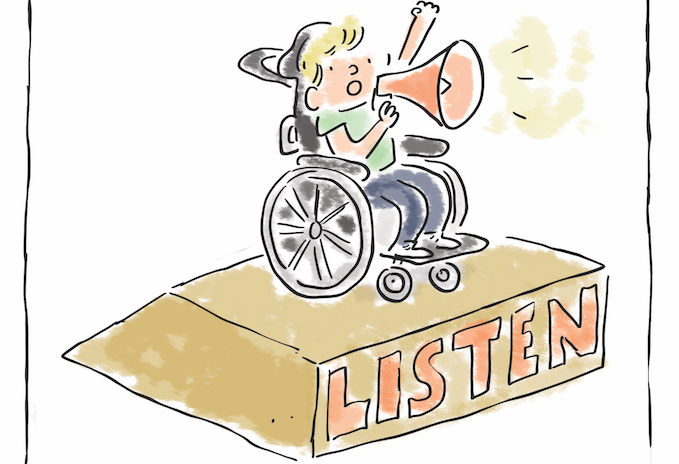8 March 2018
There is over reliance on individual schools to plan for the needs of pupils with physical disabilities and not enough being done by local and Welsh Governments. This is the conclusion of a follow-up report published by the Children’s Commissioner for Wales, Sally Holland.
The report found that only one of Wales’ 22 local authorities sought the views of young people when forming their accessibility strategy; a document that sets out how an authority will improve the experiences of disabled pupils in its schools.
However, the authority was not able to say how it had consulted with young people or how their views had shaped the strategy.
By law (Equality Act 2010), local authorities also need to make sure that their strategy is being implemented. According to the report, 18 authorities had their strategies in place.
The accessibility of the strategies themselves is also questioned by the report; the Commissioner’s office found just two published on authority websites.
Sally Holland, the Children’s Commissioner, said:
“We’ve found some very good practice by individual schools but I want local authorities and Welsh Government to play a more proactive role in enabling pupils and their families to make informed choices and to assist more pupils with disabilities to attend the school of their choice, along with their friends.
“In particular, it’s very disappointing that no local authority has been able to demonstrate how it has involved children and young people in producing its accessibility strategy.
‘Without listening to children and their families, it’s difficult to see how authorities can effectively assess the provision they currently have in place, or plan improvements.
‘The needs of disabled children are much more than ramps and rails; there are often issues that will be unique to individuals that can only be understood through dialogue with young people and their parents.
‘If we want all children and young people to succeed, we must empower them to shape the environments in which they learn.’
The report also calls on Welsh Government to refresh its guidance ‘Planning to Increase Access to Schools for Disabled Pupils’, dating back to 2004.
In response to the Commissioner’s office’s original report, the Government committed to publish the refreshed version in May 2017.
Despite the promise, the guidance has yet to be updated and many pupils will have commenced their school journey or undergone transition periods to new schools without the revised guidance for schools and local authorities being available.
Professor Holland also expressed concerns about the lack of strategies for improving accessibility to schools that were readily available to view online.
‘Disabled children and young people and their families need good information about how they will be able to access local schools, and any plans the local authority has to improve this.’
‘Local authorities should be accountable to the young people and families they serve. If strategies aren’t readily available online, it makes it difficult for people to see those strategies and to share their views on their contents.
‘Ideally, I want all authorities in Wales to create these documents in consultation with disabled young people and then to make viewing them as easy and accessible as possible.’
Schools
As well as the legal duty on authorities to publish accessibility strategies, individual schools must also publish plans that show how they will accommodate disabled children’s needs.
The report contains examples of how individual schools have met with children and families to understand their requirements, and the positive effect this has had on their education.
Malin, a 14-year-old wheelchair user who attends Aberconwy school in Conwy, has spoken about the adjustments his current school has made to meet his needs.
‘My parents and I had initial meetings with the school before I even started to advise what my needs would be to attend school independently. My worries were eased because everything that could be done was discussed before I attended.
‘I can get around to most places in school – the only place which was difficult for me to access initially was the music block. The music area has now been moved so I can access all areas of my school. If we have school trips we talk about how I can manage it the best way which means I do not have to miss out which would make me feel sad and left out and different.
‘Being able to access all areas of the school makes me feel independent, I do not like to feel different from the other children. Nothing has ever been made to make me feel an inconvenience.’
Mr. Ian Gerrard, Head Teacher at Aberconwy school said:
‘As a school, our main priority is for all pupils to access a full education and to ensure no child is excluded from any activity we undertake.
‘Due to our close working relationship with Malin and his parents, we have been able to implement changes and adjustments to make his school life accessible and inclusive
‘We have introduced a specialist toilet facility in partnership with Sodexo, we have adjustable desks in all Malin’s classrooms, will allow time between lessons for Malin to move around the buildings freely and we store and charge his wheelchair over night for him at the school.
‘We believe if you give all students access to a full education, the progress they can make is limitless.’
Immy, a student at Whitchurch High in Cardiff, said more support was needed for young disabled pupils starting secondary school.
‘There is quite often a gap in support when you go up to secondary school. The secondary school I looked at initially, I couldn’t go to because it wasn’t accessible or suitable for me. That meant I couldn’t go to secondary school with all of my friends.
‘My secondary school now has six wheelchair users and even though we all have different needs, it’s good to see other wheelchair users in my school as well.
‘I think all nurseries, primary schools, secondary schools, colleges and workplaces should be completely accessible for all people in wheelchairs.’
A spokesperson from Whitchurch High said the school had made several adjustments in recent years to improve the experience of disabled pupils.
‘We have made numerous changes to the school environment, including lifts being installed, ramps being created and whole school yards being raised to enable access to numerous classrooms.
‘We consider ourselves to be on a journey, one where we will continue to reflect on the environment both inside and outside the classroom, with our overarching aim to be one where all learners have no barriers to their pathway in life.’
Sally Holland added that all local authorities and schools in Wales should prioritise listening to children and young people’s experiences:
“The examples within my report clearly demonstrate the positive effect meaningful engagement can have on the development of plans and strategies. They become meaningful documents that enable authorities and schools to meet pupils’ needs far more efficiently and effectively and provide children and their families with accessible information.”


